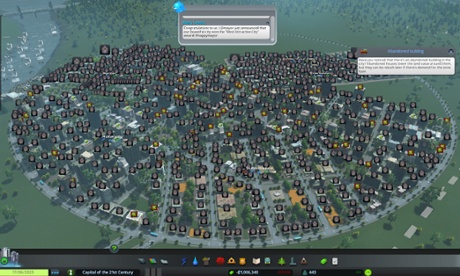
There is no “game over” in Cities: Skylines, just 400 or so citizens rattling around the remains of my city. Whole districts are abandoned, public services have been shut down, employment has collapsed and the budget is crippled by Greek magnitudes of debt. There is also no democracy, or I would have been voted out of office long before the lights went out. “Where has everybody gone? #ghosttown” peeps my timeline. I had tried to break the rules of the game, and ended up with a broken city.
I wanted to use Cities: Skylines to test an alternative economic model which challenges the assumption that growth is only good. In a world of finite resources, is it sensible, or even possible, to plan for infinite growth? Or as Tim Jackson asks, is it possible to achieve prosperity without growth? Could the game be bent to build a post-growth city where the economy is based on social exchange rather than consumption?
I lay out my post-growth city within a circle, as a finite boundary for development and a nod to the heritage of quixotic planning, from Howard’s Garden City to Burning Man’s Black Rock City. I start with a kind of unproductivity plan: keep growth slow and employment high. Jobs are in teaching, healthcare and public service – professions that contribute meaningfully to society and directly improve the quality of our lives. All energy production is renewable. Industrial districts are zoned for agriculture and forestry. There are no offices, no shops, and no landfill sites.
At first, it seems to work. People are healthy and well educated. Crime is almost non-existent. But my citizens are insatiable consumers, infuriated by the boredom of a good quality of life, and it doesn’t take long for them to balk at my pious, dematerialistic policies. I get complaints that “there’s nothing to do at weekends”. The blue bar, showing demand for commercial space, fills to the top. The game lectures me: “People want places to shop and enjoy themselves.” I’m tempted to placate them with a “Statue of Shopping”.
Instead, I invest more in public services. I build high schools, fire stations and bus routes. I plant trees on every street and put public spaces in every district. The logic of the game quantifies the benefits of this public infrastructure through private interests: “Parks and plazas raise the value of land around them, making citizens happy”. It also calculates infrastructure as a liability, which starts adding zeros to the expenses column of my budget. I’m soon pushing taxes up to 14% to balance the books, but this causes people to leave town in droves, shrinking my tax base and leaving behind vacant buildings.
The soundtrack changes tone from soft strings to a more ominous sounding brass section. The game urges me to “Grow the city!” It offers policies to liberalise work-safety rules to boost productivity. I resist, but eventually have no choice but to take out a troika of loans at unfavourable rates. I’ve now been lured into a dependence on growth to service the public debt. But with no growth forthcoming, the city is on the brink of bankruptcy and I’m forced to accept the terms of a bailout.
Cities: Skylines’ answer to whether we can achieve prosperity without growth is a resounding no. The game’s boomtown model is of course incompatible with post-growth theory. But then I found other aspects of its code incompatible with my experience of the messy reality of working as an urban planner in London. The game doesn’t account for the joys and challenges of local politics, heritage, or hand-to-hand negotiation with developers. So was the decline and fall of my city a failure of my ambition, the game, or society? I’d suggest that the goal of the game - rapid urban growth from scratch - isn’t the goal we should have as city makers in the developed world. What we could really use is a game that helps us develop and test a compelling alternative.
Finn Williams is the founder of Common Office and public planning think tank NOVUS.

